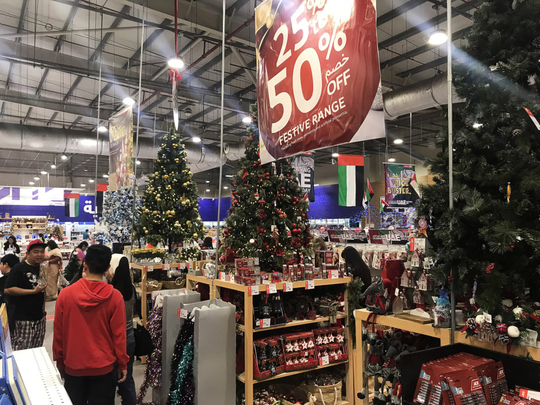
Dubai
UAE’s retail landscape is expected to grow at a rate of 3 per cent in 2018, improving slightly over the current year and reaching a value of Dh196 billion, analysts told Gulf News pointing out VAT implementation will have a minimal impact due to low rate of 5 per cent; however they say the rapid expansion of e-commerce businesses will pose a challenge.
The UAE’s Federal Tax Authority will start implementing value added tax on most goods starting from January 1 including on food and beverages, telecommunications, electronics, jewellery, hotels, petrol, among other things.
“Considering VAT implementation is expected to have a minimal impact on the consumption rates as the tax rate is quite low, with a mild increase in Inflation, retailers will manage softened demand through re-pricing and offering products with higher value proposition,” said Nikola Kosutic, head of research at Euromonitor International.
But the major challenge for retailers is going to be the rapid growth of e-commerce as well as new retail supply coming into the market. Analysts expect e-commerce to gain further momentum in 2018 garnering a larger share of retail consumer spend.
“E-commerce in the UAE has witnessed the entry of some major players in 2017 and is consequently expected to gain further momentum in 2018, garnering a larger share of retail consumer spend. Also, it is expected that significant new retail supply may be added in 2018, leading to increased competition,” said Anurag Bajpai, Partner and Head of Retail, KPMG in the Lower Gulf.
On the other hand, macroeconomic conditions, which have been challenging the industry since 2016, could see some uplift if oil prices continue to remain stable and consumer sentiment improves in 2018.
“Further, with new attractions being introduced in the UAE, the outlook for tourist arrivals remains positive. This may contribute to higher retail spending, thus reaffirming the UAE as a shopping and entertainment destination,” said Bajpai.
“While the implementation of VAT may have an immediate impact on consumer spending, it is not likely to affect retailers in the long term, for consumers will eventually adjust to the new normal.”
Jean Salamat, a principal at Strategy&, also said 2018 will be a productive year for the online retail space, while the offline retail market will struggle to regroup and acquire new capabilities to compete effectively with the e-commerce industry.
“There will be a rapid growth of e-commerce market in the region, which is estimated at 15-20 per cent CAGR (compound annual growth rate) for the upcoming years.”
Investments in e-commerce infrastructure, improved and globalised e-commerce supply chain, establishment of new last mile delivery companies will drive the aggressive growth in the e-commerce market, he said.
Other factors that will boost online business include increased competition among e-commerce firms for better product offering and product category coverage and increased consumer confidence driven by organic and regulatory factors.
Saudi Arabia is expected to pass the long pending e-commerce law facilitating improved shopper rights.
On the challenges for brick and mortar retailers, Salamat said retailers will continue to play defensive, trying to establish their own e-commerce platforms, with limited internal capabilities and strengths, like lack of in-store expertise, experiences and digital integration.












